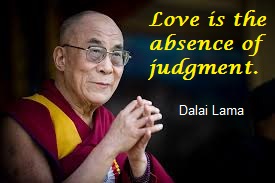When I asked for guidance about what to write my blog about, the answer came back “love”.
I guess I shouldn’t be surprised. After all, my motto is “Love is the answer to all questions.” What other answer did I expect to get?
The reason that love is the answer to all questions is that love is all there is. Everything that God created was created from what God is. God is love; therefore, everything in God’s creation is love.
You and I, the Dalai Lama, the beggar on the city street corner, the man holding a gun in a crowded nightclub, the man raising a fist to his wife, the general who sends young soldiers off to war, and the priest who prays over their dead bodies – all are made of love. It is just our perception, and theirs, which creates a different impression for us.
I have been reading a book called The Soul Code: 33 Days, by Marlene Harvey, in which she relates her 33 days of conversations with a group of beings of light whom she could see from a young age, and who described themselves as her higher self.
I found it interesting to discover that the first spiritual principle she was given by these beings was: “There will be no judgement by comparison.”
Her spiritual helpers went on to explain that: “Without the act of comparison, judgement cannot exist.
When we seek to end our need to compare, we support things as they are.
We end the relentless cycle of more or less, great or small, and then an acceptance of each aspect of the self becomes sufficient unto itself.”
This acceptance is extended from the little self to the big Self, the all that is.
Imagine if we never compared one person with another, never judged one as better than the other. We would not consider the priest or the Dalai Lama to be any greater than the beggar. And whilst we may not condone the acts of the man holding a gun in a nightclub, or the man raising a fist to his wife, we would not judge the person carrying out those acts.
Marlene Harvey’s spiritual helpers advised that: “Our judgements, the way we judge, are the small acts of terrorism in our life.”
It is these small acts of terrorism which lead to bigger acts of terrorism. We see others as worse than us, and often we blame others for all of our woes. When we judge the man holding a gun in a nightclub as worse than us, we are taking the first step towards becoming just like him.
The man raising a fist to his wife doesn’t understand that he has total control of his life and everything that happens to him, but believes, instead, that she is somehow responsible for his pain. When we make judgments about him, we are making that same mistake.
I know this is a difficult ask. It is based on our aims in this life – to be more God-like, and God is unconditionally loving to all.
Jesus told us this in Matthew 5:44-45: “But I say to you, Love your enemies and pray for those who persecute you, so that you may be children of your Father in heaven; for he makes his sun rise on the evil and on the good, and sends rain on the righteous and on the unrighteous.”
Yet, if we are to succeed in this, we first have to accept the fact that we may not succeed. We need to understand that we needn’t judge ourselves either. If we had already succeeded in becoming unconditionally loving to all, we wouldn’t need to come to Earth to learn and practise this.
We need to love ourselves first, and then we are in a position to love others. We need to include ourselves in those who are worthy of love.
We need to accept all aspects of ourselves, while we endeavour to accept all aspects of others.
Whilst we endeavour not to judge ourselves or others, it doesn’t mean we stand idly by and allow another to be hurt or killed. It doesn’t mean that we should take no action to aid those we perceive as the victim.
We should keep in mind, however, that we can never have a complete understanding of the circumstances surrounding these actions, nor the soul contracts established between the actors in this play.
Even though it is hard to understand from our limited perspective, there is a lot more going on than we can ever know.
As Shakespeare’s Hamlet explains: “There are more things in heaven and earth, Horatio, than are dreamt of in your philosophy.”
We can gain another lesson from another book, and understand that all books can be God’s sacred text, and all people can be God’s mouthpiece. This lesson comes from the Qur’an: “Requite evil with good and your worst enemy will become your dearest friend.” (Fussilat 41:34)
These are the lessons we must aim to learn, if we wish to create a peaceful world. We first have to change ourselves, before we can see a change in the world, as Mahatma Gandhi once advised.
If you can let go of judgment, you will understand that you are just as likely to be a mouthpiece for God as Shakespeare’s Hamlet, Mahatma Gandhi, or the Dalai Lama. When you let go of judgment, you, too, can requite evil with good. When you let go of judgment, you can become the magnificent child of God, you were destined to be.
In case you missed it, you may be interested in reading a previous blog with a similar theme:
http://www.lorelletaylor.com/requite-evil-with-good/


Leave A Comment